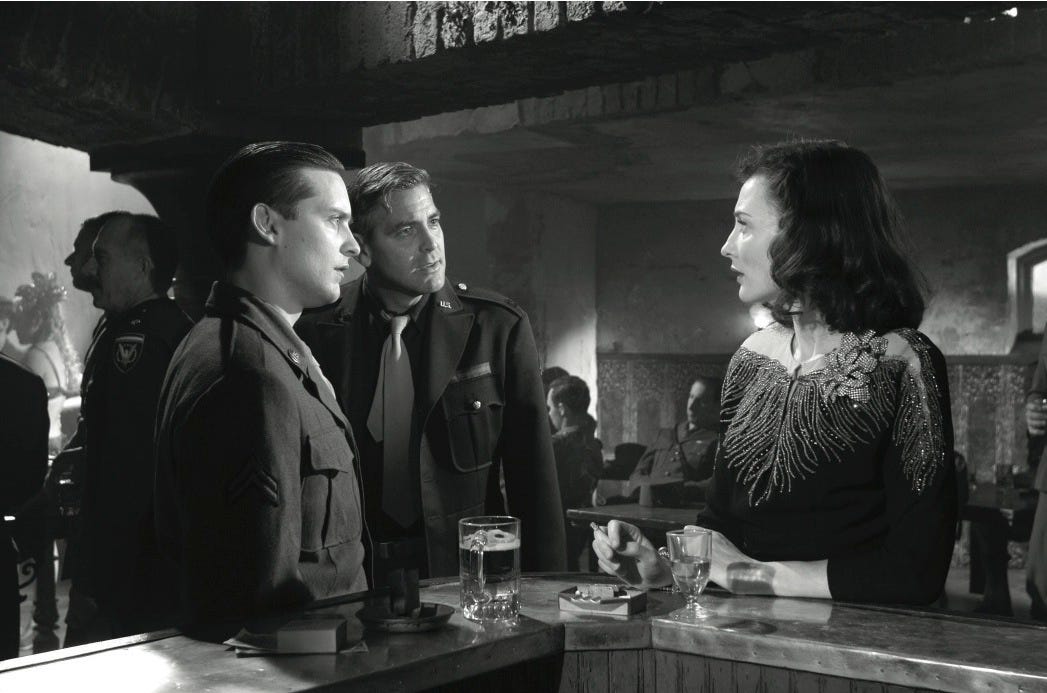The Good German (2006) Beautiful neo-noir from Steven Soderbergh
“Just because you’re a German doesn’t make you a Nazi”

Presented in a somewhat time sensitive yet still unusual aspect ratio of 1.33:1, Thomas Newman’s dramatic and Oscar nominated musical score thunders over neo-noir opening credits of the crumbling remains of Berlin as World War II nears its end and following a scattered assortment of real life stock footage of the time of Berliners and Russian and American troops walking among the wreckage of a bombed out city, we cut to an overhead shot of an airfield and “Berlin, July, 1945” before returning once more to stock footage and cine reels of the time of Harry S Truman, Winston Churchill and Joseph Stalin “scheduled to meet outside the city, in Potsdam, to draw the post-war map. Only Japan continues to fight…”
We cut to an as yet unnamed Congressman disembarking from an aeroplane in Berlin and quickly behind him “Captain Jacob Geismer” (George Clooney) a war correspondent for The New Republic and following a change in camera angle, a smiling “Corporal Patrick Tully” (Tobey Maguire) Jacob’s (or more commonly known throughout the film as “Jake”) officially appointed driver throughout his stay in Germany. Similarly known by his shortened moniker of simply “Tully”, we cut from his German welcome for the senior ranked man to a camera angle behind the two men as Tully drives Jake to his quarters. Already on display is Tully’s motormouth and inquisitive nature as a side on camera angle of the two now captures both Tully’s carefree attitude to life in Berlin and a raft of scattergun questions for the Captain beside him. Responding that he’s here in Berlin only to cover the peace talks for The New Republic, Jake also confirms jokingly that the only war action he’s seen was in London and, much to the amusement of Tully, “the uniform is the army’s idea of a joke”.
Still rather dominating the conversation, Tully laments “I wish I could write. I have some great stories to tell” before the first screen “wipe” of the film transitions the action instantly from Tully’s car to Jake and the Congressman arriving at their hotel to a second wipe and Tully now helping Jake settle into his room and with a smile he confirms “I’m your driver for the duration of your stay here in Berlin” before presenting the Captain with a bottle of whiskey. A “housewarming present” he says with a smile.
A narration from Tully soon begins:
“I wouldn’t myself have sized him up that way, you know? Just meeting the guy you wouldn’t have thought of him as a patsy. That’s what I love about Berlin. Even a guy who wasn’t a patsy back home turned into one. It was inevitable”
As Jake searches his pockets for his wallet, Tully’s narration continues:
“The city spread its legs. And all that “eat, drink and be merry” bullshit. “Seize the Day”. It sure didn’t make anyone smarter. And the best part of it was no-one got hurt. There was too much money around for anybody to fall down without a nice soft cushion. Occupation Marks printed just for us. Funny money”
Throughout the above narration Tully has been framed in front of a bathroom mirror meticulously preparing for a night out, Jake’s stolen wallet on a nearby table. Now driving…
“It didn’t feel like losing it when they lost it. The Russians, they had to spend it before they went home”
Following a screen wipe of Tully in the middle of an aggressive act of love making with a largely unseen lady, his narration continues:
“Which was all everyone talked about, going home. Everyone, even the Russians. God, who would ever want to? Say what you want about the war, I would never wish for all those millions of people to die, but the war was the best thing that ever happened to me. When you have money, then, for the first time in your life you understand it, what money does for you. Where before, all you understood was not having it. Money allows you to be who you truly are”
Bathed in shadows, we cut to “Lena Brandt” (Cate Blanchett) emerging slowly from the bedroom. Downcast, melancholic and lost in her own thoughts, she stands with her back to the wall between the ending of the hallway and the entrance to the kitchen where she watches Tully roll a cigarette. Director Steven Soderbergh now cleverly cuts back and forth between the two as tensions mount between the arrogant and youthful boy soldier and the more mature prostitute eking out a wartime living. Tully, still rolling a cigarette, dismissively asks if Lena enjoys her job. Lena responds with a sarcastic and cutting “How do you like working in the motor pool?”. A close-up on Tully perfectly demonstrates his rising anger at Lena’s response to his own hurtful question before he sharply raises himself from behind the kitchen table, shouting out his supposed wartime responsibilities, side hustles and now screaming directly into Lena’s face “The motor pool is the best fucking job in the army”.
After apologising for her question in order to diffuse the situation, we cut to a camera angle over a now seated again Tully to Lena still standing with her back against the wall nearby. All shadows now: Lena half seen and bathed in them, Tully and his own shadow self, rolling yet another cigarette, the Berlin rain beating down outside. Lena is now seen, bathed in shadows once more, staring out of the kitchen window, smoking, and lamenting that Tully was supposed to be securing her a safe passage away from the war and away from Berlin. She now looks in his direction with the slightest of smiles as she says aloud “I forget sometimes what a boy you are” before playfully trying to stroke his hair. After a beat, Lena says her husband too was a boy who only “saw numbers in his head” before staring wistfully once more out of the kitchen window. Rising to his feet now and more calmly and in control of himself than before, Tully states that he’s Lena’s “fella now” and after promising “I’ll get you out of here”, we fade to black.
Now cutting to the following morning and with a camera mounted on the dashboard capturing both Tully and Jake in the car, they couldn’t be in more opposing moods. Tully, rattling along at the mouth as always as he boasts of his girlfriend. Jake, angry and lost in thought after “some son of a bitch stole my wallet”. Even though Tully offers to lend the Captain some money as he doesn’t want him to miss out on the delights a near post-war Berlin has to offer, this doesn’t entirely assuage Jake’s bitterness. He thanks the younger man before responding that he knows Berlin very well after living here for many years before the war and there follows a somewhat bitter exchange on life in Berlin and the responsibility each and every German has to carry for their part in their war. “Your Fräulein knew exactly what Hitler was doing” Jake exclaims bitterly, “they all knew”, before he laments that as soon as this war is officially over a new war with the Russians will fill the void. A change in camera angle now as we approach the end of the scene sees Tully offering Jake an hour with his girlfriend and essentially acting as her wartime pimp. Jake declines as he dismissively throws his cigarette out of the car and after another of the film’s screen wipes, we travel through the destroyed city of Berlin and after a final wipe, we reach the city of Potsdam…
After watching and thoroughly enjoying Steven Soderbergh’s very different and somewhat experimental 2024 film Presence I thought it high time to dust off my favourites of his from my DVD collection and rather than starting with my all time favourite The Limey (coming soon), Traffic (coming soon) or either Out of Sight or Solaris (guess what? coming soon!), I’ve started with this gem and which nearly two decades on, remains an utter joy. The film continues to tweak my conspiratorial bone (though “Operation Paperclip” and the dividing up of prominent Nazi’s post war between the Allied Forces before airlifting the majority to the freedom of the USA is hardly a conspiracy theory any more) as well as the ongoing tensions between East and West and the beginnings of an 80 year war with the Soviet Union/Russia, another Orwellian forever war, only blind to eyes that refuse to see. So we have the dramatisation of real life as well as the stigma and blanket assertion that everyone must have known what the ruling Nazi party were doing and so complicit in their crimes, together with an individual and collective guilt of survival.
Cinematically, we have a beauty of a film edited to just 105 minutes by Mary Ann Bernard, shot and lit through constant shadows by cinematographer Peter Andrews and accompanied by Thomas Newman’s Oscar nominated score (and only nomination for the film as a whole) is a triumph for Steven Soderbergh, his 16th film at the time of a career now spanning 5 decades and 36 total films from the director’s chair. Not bad for someone who supposedly retired from filmmaking decades ago! Since 2017 Steven has released a film a year and this year’s Black Bag is eagerly awaited and I cannot wait to add it to my lifetime collection of movies from the Atlanta born filmmaker.
All of this and more is contained within essentially a black and white love triangle of wading through the deceit and lies of wartime to reach a published truth, of opportunists and survivalists doing what’s needed to get by in a crumbling and uncertain world, slave labour, the horrific spectre of concentration camps, the creation of humanity destroying weapons of mass human destruction and through the innocence of Clooney’s performance, the shadows cast by Blanchette and the thoroughly despicable bastard of a portrayal from Maguire, we have the twisted Soderbergh telling of Sex, Lies, and Red Tape.
Forever a favourite of mine and all these years later, The Good German remains a quite beautiful film.
Thanks for reading. I hope this message in a bottle in The Matrix finds you well, prospering, and the right way up in an upside down world.
Whilst you’re here I may as well brag about the release of my trilogy of recently self-published books. Beautiful covers eh! As the title(s) would suggest, this is my life at the movies or at least from 1980 to 2024, and in volume 1 you’ll find 80 spoiler free appraisals of movies from debut filmmakers, 91 of the very best films appraised with love and absent of spoilers from 1990–2024 in volume 2, and in volume 3 you’ll find career “specials” on Paul Thomas Anderson and Quentin Tarantino together with the very best of the rest and another 87 spoiler free film reviews from 2001–2024.
All available in hardback and paperback and here are some handy links:
"A Life at the Movies Vol.1" - link to Amazon
"A Life at the Movies Vol.2" - link to Amazon
"A Life at the Movies Vol.3" - link to Amazon





